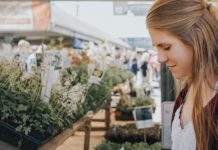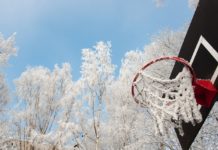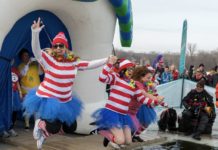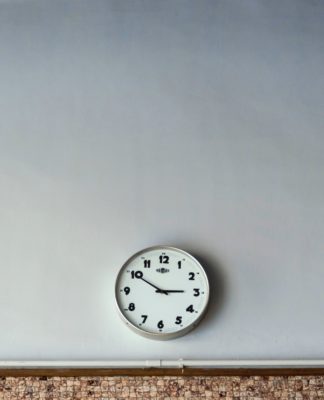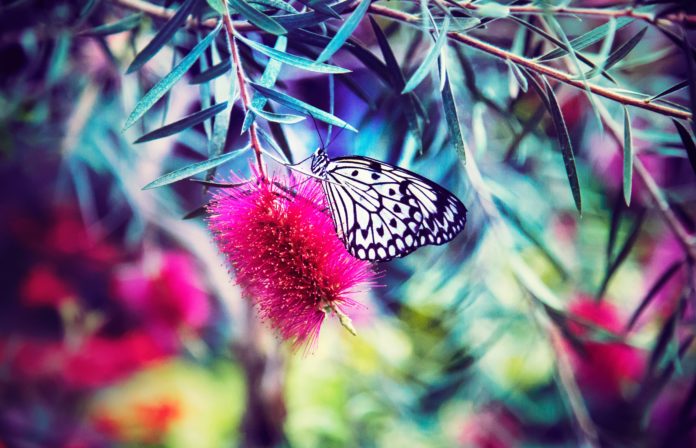
The plight of the honey bee has caused great concern from all around the world. And no, I’m not referring to Jerry Seinfeld’s Bee Movie that distressed many moviegoers with its questionable human/bee romantic storyline (still so many questions about that movie…). As disconcerting as the Bee Movie plot may be, however, it is important that we have an active, and most definitely platonic, relationship with bees in the real world.
Without bees, producing food is exceedingly difficult. Bees and other pollinators are imperative to our food system and plant biodiversity. According to Planet Bee Foundation, “The vast majority of plant species– almost 90%, in fact– rely on pollinators to reproduce.” These pollinators help us out by carrying pollen from one plant to another and fertilizing them in order for plants to create fruit and seeds to make the food that ends up on our plates.
And if you’re a fan of eating food, which I most certainly am, you can help support bees and other pollinators by creating an easy-to-make pollinator-friendly garden.
So how do you begin?
Go organic:
Whether you have a sprawling yard or simply a windowsill, it’s easy to create a pollinator-friendly garden. Size truly doesn’t matter. To best support our pollinator friends, go organic. By using sprays and pesticides you can hurt or kill pollinators and even the plants you’re attempting to grow. Bees and butterflies thrive best without battling toxic chemicals.
Just remember, insecticides are used to kill insects which is the exact opposite of your pollinator-garden goal. And according to the University of Minnesota, forgoing insecticides provides endless benefits including increasing natural enemies. For example, “insects such as spiders, lacewings, ladybird beetles, and ground beetles actually help to control unwanted pests.” Even alternative pest control methods such as oils and soaps can still kill caterpillars and pollinators.
Types of plants and flowers:
When deciding which plants and flowers to grow, choose nectar-producing plants that bloom throughout the entire season in order to continuously entice and feed pollinators all season long. These types of plants include both annuals and perennials along with wildflowers and native plants. It is best to plant a wide diversity of plant species to attract and support the dozens of different bee and butterfly species. And if you’d especially like to attract butterflies, group similar colored flowers and plants together as butterflies find this arrangement most appealing.
Best flowers and plants for bees and butterflies:
- Purple Coneflower
- Purple Prairie Clover
- Sunflowers
- Oregano
- Goldenrod
- Milkweed
- False Indigo
- Rough Blazingstar
- Beebalm
- Dill
- Joe-Pye weed
- Nasturtium
- Petunia
- Aster
- French Marigold
- Peony
These plants will make pollinators happy and help your garden thrive. You can also supplement your pollinator garden by making your own feeder to attract bees, butterflies, and even hummingbirds. Simply fill a feeder with a solution of one part sugar to nine parts water. You can buy a feeder or DIY a feeder with these easy instructions from the University of Minnesota:
- Use an inverted small jar and puncture/drill a small hole in the center of the lid.
- Plug the hole with cotton.
- Fill the jar with the sugar-water solution. (One part sugar to nine parts water.)
- Make the jar more attractive to pollinators by attaching brightly-colored fabric petals to the lid.
- Hang the feeder near your garden and enjoy.
By growing even a few of these pollinator plants you will not only be helping to sustain and support the ever-struggling bee population, but you will have an incredibly beautiful garden to enjoy all summer long.
And if you’d like a little more inspiration, watch this amazing slow-mo bee action courtesy of the University of Minnesota:
Read next: The Joy of Gardening



